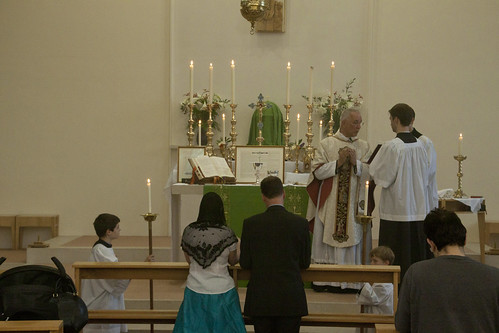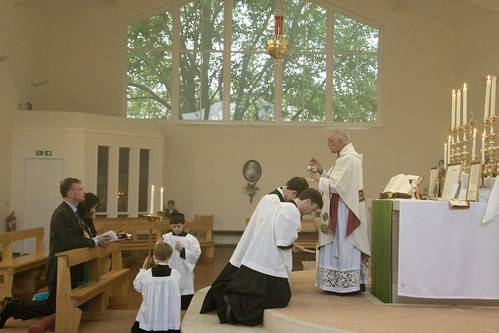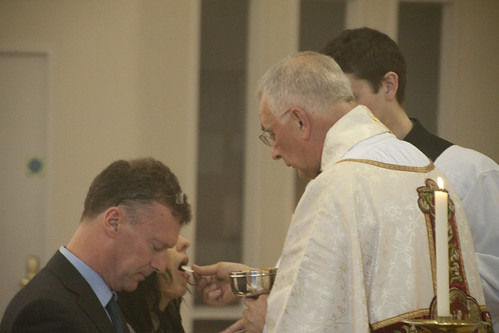
In my last post I made the point that being merciful to divorced Catholics seeking to remarry can be a failure to be merciful to those whose marriages or families would be destroyed, if the sanctity of marriage is yet further undermined. There is also the question, which I address here, of how exactly the Church's rules could be changed.
It has become common for liberals to appeal to the practice of the Orthodox churches as a precedent which could be followed by the Roman church in dealing with divorce. The Orthodox allow a second marriage, and sometimes a third, after divorce.
What is interesting is the way the Council of Trent defined the issue:
Can. vii. If any one shall say that the Church errs when she has taught, and now teaches, that according to the doctrine of the Gospels and of the Apostles the bond of Matrimony cannot be dissolved owing to the adultery of one of the partners, and that neither party, not even the innocent party who has not by committing adultery given any ground (for separation), is free to contract another marriage during the lifetime of the other partner, and that he who after putting away his adulterous wife marries another, commits adultery, or the wife who after putting away an adulterous husband marries another, let him be anathema.
This teaching, expressed as a formal anathema by a General Council, is infallible.
The argument is made - I am tentative because I'm not in a position to judge this on historical grounds - that this condemns the proposition:
P1: The Church is in error when she teaches that re-marriage after divorce is illicit.
and not the proposition
P2: Remarriage after divorce is licit.
in order to avoid condemning the Orthodox practice. This practice was in use among Greek subjects of Venice at that time of the Council of Trent, who were in communion with Rome. They could carry on saying that remarriage was possible (P2), as long as they didn't condemn the Roman view as wrong (P1).
As far as making possible the adoption of the Orthodox practice in the West goes, this is a pretty small mouse-hole to creep through. The first thing Catholic would-be reformers do when they propose a change is almost invariably to say that the Church has been in error to say that marriage is indissoluble. So they immediately incur Trent's anathema, and the argument ends there. It is terribly hard, in fact, to see how any articulation of the Orthodox view would escape the anathema, but the Orthodox do in fact affirm that marriage indissoluble, but somehow can 'die' as a result of sin.
I'm not going to try to explain what exactly this distinction means. It is open to Western theologians today simply to say that the Orthodox position is wrong, and that seems to be what Archbishop Muller was saying recently:
This practice cannot be reconciled with God’s will, as expressed unambiguously in Jesus’ sayings about the indissolubility of marriage. But it represents an ecumenical problem that is not to be underestimated.

For the sake of argument, however, let us consider the possibility of the Roman church adopting the Orthodox practice. Would this solve the problem we currently have?
The difficulty here is that the Orthodox practice operates on different principles to the Western one. In the West we have procedures to determine nullity (to speak only of sacramental marriages): that the marriage never took place. If this is so, both parties are free to marry. It may, or may not, have been the result of one or both parties' sin, but in any case subsequent marriages are in no way impugned. There is no limit to how often this can happen. In societies with easy divorce and poor formation of Catholics, this practice can keep up with social conditions. More marriages are likely to be null.
For the Orthodox, there is no procedure of annulment. The first marriage is on the conscience of both parties. Remarriage is permitted as a dispensation, and the petitioner is given a penance. The subsequent marriage service is penitential in character. A third marriage might be allowed, but that is made even more low-key. Fourth marriages are forbidden - even when the spouses have died. The catch-phrase is that the Church "blesses the first marriage, performs the second, tolerates the third, and forbids the fourth."
No doubt cases which a Western tribunal would declare null will often be cases where among the Orthodox a bishop will allow a second marriage, and vice versa. It is actually not at all clear that the Orthodox practice is more lenient. It will in fact depend on what Orthodox bishop is being compared to what Western tribunal. There will certainly be cases in which a couple who could have got a decree of nullity in the West will not qualify for remarriage in the East.
What is clear is that one cannot make the Western practice more lax simply by adopting all or part of the Orthodox practice. The two systems work upon completely different principles, even if the results overlap. You couldn't keep the concept of nullity and add to it the idea that marriages can 'die' allowing a bishop to give you a dispensation to remarry along with a penance. That would create a Frankenstein theory of marriage with no support from the traditions either of East or West.
Another problem, for liberals, is this penitential business. Is this something which Western divorcees are really going to swallow? Such a thing seems, at least to me, quite inconceivable.
References to the Orthodox practice, in the debate about divorce and remarriage, are essentially a fraud. Liberals like the idea of remarriage without the first marriage being null, but they would never accept the corollaries which have maintained a practical respect of the sanctity of marriage in the East over the centuries.
It is, in fact, a familiar trick. Liberals see some aspect of practice of some former era, or some distant and unfamiliar rite, and seize on it as being attractive, but on closer examination they only find it attractive because they have ignored the context in which it actually makes sense.
Didn't people exchange the kiss of peace in the congregation once upon a time? Yes: but never between the sexes! Didn't people receive Communion in the hand in old times? Yes, but they never picked it up, and their hands had to be ritually washed afterwards, and sometimes before too. Didn't people stand for Communion in former ages? Yes - after kissing the priest's foot first, or something similar.
In fact, the idea that the Orthodox churches are some kind or paradise for liberals is so utterly absurd that the liberals using this argument should be ashamed. Since they think we have so much to learn from the Orthodox on the subject of marriage, let's hear what Metropolitan Hilarion (leader of the Russian Orthodox Church) has to say about Same Sex Marriage.
We have to state clearly that those countries that have recognized in law homosexual unions as one of the forms of marriage are taking a serious step towards the destruction of the very concept of marriage and the family. ...
The notion of parents, i.e. of the father and the mother, of what is male and what is female, is radically altered. The female mother is losing her time-honoured role as guardian of the domestic hearth, while the male father is losing his role as educator of his children in being socially responsible. The family in its Christian understanding is falling apart to be replaced by such impersonal terms as 'parent number one' and parent number two'.

I assume you are not overlooking the case where a Catholic in a valid though non Sacramental marriage (because married to an unbaptised person) can have the valid marriage annulled in order to marry a baptised, person.
ReplyDeleteApart from the Pauline privilege and the Petrine Privilege I think there is also (perhaps it is covered by one of the foregoing privileges) a case where one party though married becomes solemnly Professed in a \Religious Congregation..
I look forward to your third article on Marriage. The first and second were impressive, imho..
Thank you, Dr. Shaw.
Thank you!
DeleteYou are right of course. I'm only talking about sacramental marriages. It is interesting that the grounds for the dissolution of a natural marriage are still terribly limited.
Thank you,
DeleteIs it true that when one party becomes Solemnly Professed in a Religious Congregation the other party, though validly and SACRAMENTALLY married can marry again....i.e the Church grants a true divorce?
I don't think so. But I'm not a canonist.
DeleteYour comment EFpastor emeritus, is rather ironic in that the picture Dr. Shaw has used are of our Nuptial Mass to validate our non-sacramental marriage on our 25th wedding anniversary!! Neither of us realized it was non-sacramental, though my husband was not baptized when it contracted.
DeleteA great day it was!
DeleteIt was; and I love seeing the photos here and anywhere else they appear! :-D
DeleteExactly. Also, Orthodox pastors and (especially in the homeland) bishops are much closer to the flock than their Latin counterparts tend to be, so they can make these kinds of decisions on remarriage carefully.
ReplyDeleteMoreover, even in cases where the spouse is deceased, at a second marriage the crowing of the couples is never performed.
What happened to the internal forum? Nothing need to be changed in the teaching on marriage, but priests can consult with divorced and remarried people and agree for them to receive communion where there is no fault involved and no sin - and nobody else need be involved. Human life does not always fall within the exact categories of Catholic disciplines - why cannot we be flexible in this kind of way? If those who are in a state of objective sin should not be allowed to receive communion, then maybe nobody should.
ReplyDeleteThis is more directly addressed in the next post.
DeleteI don't understand the distinction you are making between condemning the view that re-marriage is licit and condemning the view that the Church has erred in teaching that re-marriage is illicit. If the Church hasn't erred, and she hasn't, then re-marriage is illicit.
ReplyDeleteI was hoping someone like you could explain it to me! I find this asserted, that Trent avoided condemning the Orthodox practice. But it is a very subtle distinction.
DeleteInterestingly the suggestion has made its way into a footnote in the most recent version of Denzinger. But it is I am sure a distinction without a difference. The footnote is badly written, in any case, speaking of the canon as a teaching of 'the Latin Church'. The Latin Church has its own laws and rites, but not its own teachings. The Catholic Churches of Eastern rite don't have different teachings.
DeleteIt's true that this canon is expressed in a circuitous way. But canon 5 effectively teaches indissolubility anyway, without a special reference to the Church. The phrasing of canon 7 may reflect the fact that people didn't want to say that the gospel was wrong about marriage, and so were saying that the Church was wrong in her interpretation of the Gospel. One would need to look at the conciliar Acta for more light on the subject.
I suppose in strict logic people would be allowed to say 'I don't know whether the Church is wrong or not' and not fall foul of canon 7, but I can't believe that the Fathers of Trent intended that!
This is one of the reasons I left the Orthodox Church and joined myself to Rome.
ReplyDeletehttp://tranquillitascatholic.blogspot.co.uk/ (my blog)
Filippo.
The rules of the Catholic Church seem to be extremely flexible, or at the least confusing, when it comes to the Kennedy family. I don't remember any outrage when Jackie married the divorced Ari. And both she and the scandalous, pro-abort, twice married Teddy were accorded marvelously rich funerals that were attended not only by very impressive secular lists of dignitaries but also clerical of the bishop/cardinal variety. Then there's the Catholic Church accommodation of Joseph P. Kennedy the 2nd's annulment followed by it's call back. All of the above are very confusing and may I say scandalous situations. But then there are even more mind boggling manipulations of circumstance when, as I observed with my former business partner, he discovered that he could legitimately "Catholic Church marry" his Catholic 2nd wife because he was able to track down an infant baptismal certificate (the first and last of his Catholic Church experience until his 2nd wedding). This document made his first marriage illegitimate in the eyes of the church so it was full speed ahead with a very impressive Catholic nuptial mass. I sort of cringed when they affirmed their willingness to lovingly accept the blessing of children knowing, as I did, that he had already had a vasectomy. I think, all things considered in my Catholic life experience, the Orthodox way may be worth further review. Currently there's just too much circumstantial weirdness.
ReplyDeleteJoseph Kennedy discovered that the Church is not as flexible as he would have liked. What's that supposed to prove?
ReplyDeleteCatholics in illicit marriages are in an objective state of sin, they aren't excommunicated. So they are refused Communion, not Christian burial.